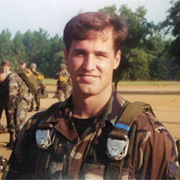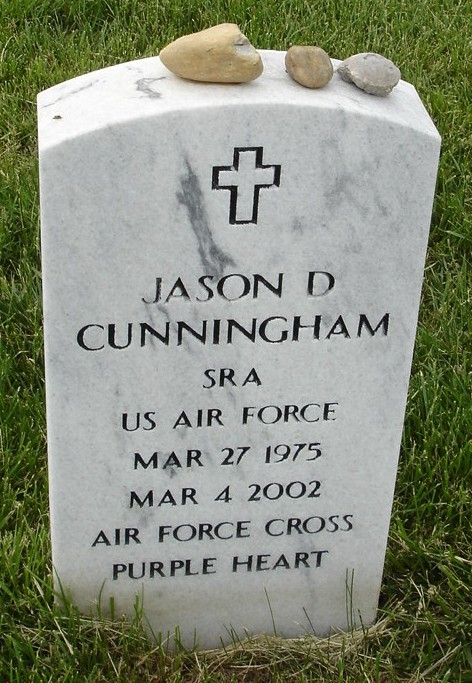Book details war heroism of airman
Military medic was awarded the Air Force Cross posthumously
October 3, 2005
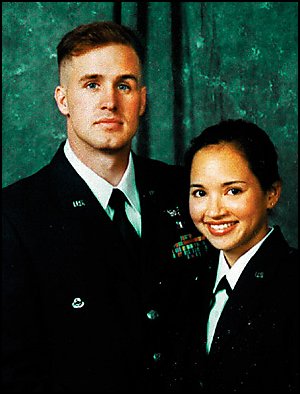
Airman Jason Cunningham, a military medic with ties to Ventura County, moved his wounded comrades to safety three times while exposing himself to enemy fire that eventually cut him down, according to a new book about his death on a snowy mountainside in Afghanistan.
Cunningham was married to Rio Mesa High School graduate Theresa de Castro, a resident of Camarillo, while both were in the Navy.
The 26-year-old Air Force pararescueman, or medic, was killed in combat on March 2, 2002.
His funeral was in Camarillo, and he was buried at Arlington National Cemetery.
“I talked to one guy, a surgeon who was waiting for him to come in,” said author Malcom MacPherson, whose book is among a small number that give detailed accounts of Afghanistan combat. “He told me Jason was the spiritual center of the whole medical team out there.”
MacPherson based his book, “Roberts Ridge,” on the words of those who were there, including Navy SEALs, Army Rangers, medics, combat air controller and pilots. It provides hour-by-hour details on the events leading up to the death of Cunningham and six other Americans during a battle with Taliban and al-Qaida guerrillas.
The men fought a 17-hour battle that began as an attempt to rescue Neil Roberts, a SEAL who earlier had been thrown from a helicopter shredded by Taliban and al-Qaida fire. The helicopter limped to safety in a valley, but Roberts was stranded high on the 10,240-foot mountain called Takur Ghar.
By the time two rescue helicopters carrying combat personnel and medics arrived on the scene, Roberts was dead. The choppers were quickly disabled by guerrilla fire and the long battle began.
Cunningham was killed while protecting and giving medical treatment to wounded men. Three times he moved them from the line of fire, each time exposing himself to enemy fire.
He and Army medic Cory Lamereaux picked up weapons and fought off a counterattack for 40 minutes before both were shot.
According to MacPherson, Lamereaux was hit in the belly. He suffered intense pain but survived.
Cunningham was shot once through the small of his back to the right of his spine through his pelvis. The bullet shattered his liver. Despite his pain, he checked his body, did not see blood and yelled to Lamereaux, “I think I’m OK.”
MacPherson said another medic, Matt LaFrenz, a premed graduate of Vanderbilt University, rushed to the men. He examined Cunningham and believed the airman was bleeding internally.
Cunningham was lucid, surprised and angry: “This is bull. … Cannot believe they shot me,” he told LaFrenz.
The medic knew Cunningham had to get to a surgical team right away. Army Capt. Nate Self, commander of the rescue attempt, kept calling the main base, asking for — and then demanding — a medivac helicopter.
But it was daytime, and the two wounded helicopter pilots on the mountain knew no helicopter would be sent in until five or six hours later, after dark when it was safer.
The medics did everything to try to keep Cunningham alive. They cut down padding from the walls of a crippled helicopter and tucked it inside his sleeping bag for warmth.
They talked to him to keep him alert, injected him with morphine for pain.
But nothing could keep him from slipping away. The former sailor, who had become an Air Force pararescueman because he wanted to help others, died at 6 p.m.
The medivac arrived 90 minutes later.
Last week, neither Theresa Cunningham nor Jason Cunningham’s parents had read MacPherson’s book. They said they might not read it.
For his extraordinary heroism, Jason Cunningham posthumously received the Air Force Cross, an award second only to the nation’s highest award, the Medal of Honor.
“I think he got ripped off,” said his mother, Jackie Cunningham of Farmington, N.M. “I will never understand why he didn’t get the Medal of Honor.
“There’s not an hour that goes by that I don’t think of him. Because of what my son did, those other wounded men are living with their families.”
“I am so proud that they are still honoring him,” said Cunningham’s widow, now Air Force 1st Lt. Theresa Cunningham, a flight controller at Fairchild Air Force Base near Spokane, Wash.
“A compound at Bagram Air Base in Afghanistan has been named Camp Cunningham and, in 2007, a portion of the basic training facility at Lackland Air Force Base in San Antonio will be named in honor of Jason,” said Cunningham, a 1989 graduate of Rio Mesa High School.
Currently, her hopes are to make the Air Force a career while raising her and Jason’s daughters Kyla, 8, and Hannah, 5.
“The military has a lot of respect for its history, and people here try to help us out,” she said.
About the book:
Title: “Roberts Ridge: A Story of Courage and Sacrifice on Takur Ghar Mountain, Afghanistan.”
Author: Malcolm MacPherson.
Pages: 338 pages, illustrated, hardback
Publisher: Bantam Dell, a division of Random House.
Cost: $25.
Thursday, March 4, 2004
Carlsbad Hero Honored
By Miguel Navrot
Moody Air Force Base in Georgia is naming one of its schools today for Senior Airman Jason Cunningham, a Carlsbad native and pararescueman who was killed saving 10 servicemen in Afghanistan.
Moody is dedicating its Airman Leadership School in Cunningham’s honor on the two-year anniversary of a bloody Afghanistan firefight.
Cunningham, 26, a posthumously decorated Air Force hero, helped save 10 wounded in 2002 on a snowy mountain in Operation Anaconda, a mission to uproot Taliban and al-Qaida fighters.
A member of the Air Force’s elite rescue service, he gave medical treatment under fire for seven hours to the wounded— despite being shot twice. Cunningham bled to death March 4, 2002, before rescue helicopters could save him.
“I never want anyone to forget what my son did,” said mother Jackie Cunningham of Gallup.
The two years since his death have been devastating to his mother and father. Mrs. Cunningham said she still finds herself dialing her son’s cell phone “because there is still something I want to tell him.”
“I feel like somebody kicked me in the stomach, and I still can’t catch my breath,” said Cunningham, who stays in contact with parents of other service members killed in the bloodiest day in the Afghanistan war.
“I’m a lot better in a lot of ways, but there still isn’t a day when I don’t cry.”
Seven U.S. service members died in the firefight against entrenched al-Qaida forces.
Cunningham is buried in Arlington National Cemetery. In September 2002, the service posthumously awarded him its highest honor, the Air Force Cross.
She carries on with memories of her hero
10/5/03
Lieutenant Theresa Cunningham doesn’t care what others think.
What matters is that her two daughters know that their father, Senior Airman Jason Cunningham, was a hero.
Not for the battlefield actions that led to his death in Afghanistan in March 2002, but for things he did every day as a dad and husband.
“There was nothing that anyone will ever say about him that I didn’t know. He was heroic day to day,” she said. “I used to say he’s my hero and that was his favorite thing.”
After her husband’s death, she became a commissioned officer upon graduating from Valdosta University in Georgia. She arrived this summer at Vandenberg Air Force Base, where she is a public affairs officer. Their daughters, whose names she asked be withheld, are ages 6 and 3.
“I got to know the coolest guy. I think the kids should be thankful,” Theresa said. “He was a hero to them and other people too.”
Theresa DeCastro met Jason Cunningham when both were in the Navy, and she had just arrived at her first assignment in Italy. It was Sept. 21, 1995.
“A day to remember,” she said.
“He was actually the first person I thought on contact I’m going to know this guy forever,” she said, recalling Jason had a strong personality and exuded enthusiasm.
They became buddies. “A month in, he’s like, ‘Are you my girlfriend?'” she said. “Shortly after he said, ‘You’re going to marry me.”
Five months later they were wed.
Both left the Navy in 1998. A volunteer firefighter and lifeguard, Jason loved the Navy, but wasn’t able to do what he wanted — be a search-and-rescue swimmer. They had a daughter and Theresa’s next assignment on board a ship would mean six months apart from her husband and daughter.
But the military was in their blood. She was scoping out the Navy officer training program. Jason came home after talking to a recruiter and learning of a Special Forces job.
Operating under the motto “That others may live,” pararescue jumpers save the lives of downed pilots and others in peril. They are trained as medics. Their skills include skydiving, rappelling and swimming.
“That was him,” she said. “The job was made for him.”
After he completed training over more than two years, in June 2001, he was ordered to Moody Air Force Base, Ga., where Theresa and the girls followed him. She enrolled in a college ROTC program.
Jason often bypassed nights out with buddies to be at home with his girls.
“His time off was definitely family time,” she said. “He was a very enthusiastic father.”
On Sept. 11, 2001, Jason was in Florida for a temporary duty mission.
When he returned, she recalls him saying, “This is it. We’re definitely going to go support the war.”
On Feb. 4, 2002, a phone message advised her of a meeting for deployed spouses.
“For some reason, I decided to go to that,” she said. “It was weird. It was one o’clock in the afternoon that day. I got out of class at 12 so I drove straight over there. That’s when they told us, ‘They’re leaving tomorrow.'”
They had planned to take a family portrait that night, but Theresa recalls fretting that those plans fell through.
“It’s a sign,” she recalled telling Jason.
He left for Operation Enduring Freedom at 5 a.m. Feb. 5.
In March, he e-mailed and said, “I might be home sooner than you think,” she recalls.
The next day news reports told of a helicopter crash where seven people died.
“I thought, Oh my God,” she said, adding she called his work. “I kind of stressed the whole day.”
Before going to sleep, she called Jason’s supervisor and received reassurance.
At 5 a.m. she woke up to begin a new day, feeling calmer and confident.
“I actually felt I would’ve known by now,” she said.
A knock on the door changed her life. She opened it to see Jason’s squadron commander, a chaplain and others.
One asked, “Are you Theresa Cunningham?”
Another answered yes when she didn’t
“I think it was when they took a step in the house that I knew he wasn’t coming home.”
In the weeks after his death, tales of his battlefield heroism came out. While troops came under enemy fire, Jason administered medical care even as he was wounded.
Jason is buried in Arlington National Cemetery. He is one of less than two dozen airman awarded the Air Force Distinguished Cross Medal.
In Washington, D.C., last month, Theresa learned how her husband’s death affected others. While chatting with Honor Guard members, she spoke with one who served on the funeral detail for Senior Airman Jason Cunningham.
“He didn’t know who I was. He was just speaking,” she said, recalling the conversation with the flag bearer from her husband’s burial service. “He said, “That was the saddest thing. That really hurt a lot of us. That one was tough.'”
Today, she wears Air Force blue proudly, but worries about her daughters. She sought public affairs instead of intelligence with her daughters’ in mind, worrying about time apart from the girls.
“I think that’s one thing that military officers need to come to an understanding that losing a parent has a complete impact on a child,” she said. “For myself, I lost my spouse. I lost my best friend. I lost a future in a way, but I will have my memories of him. I’m not 5 years old where I would have spent a lifetime with someone molding and shaping me.”
Still, she considers herself lucky in some ways.
“The fact is he knew we were happy. The last things we said to each other were, ‘I love you.’ I think the story was complete in a way.”
From contemporary press reports:
September 13, 2002:
There have been times in this country when the armed services dead numbered in the hundreds and sometimes thousands each week.
But the death of one man can still move thousands to tears, and at Kirtland Air Force Base on Friday, the tears flowed freely in memory of Senior Airman Jason Cunningham.
In awarding the Air Force Cross to Cunningham on Friday, Air Force Secretary James G. Roche, his voice breaking, said, “On behalf of a grateful service and a grateful nation, we present this award representing extraordinary heroism as a symbol of our deep gratitude for his service,” Roche said.
The medal was presented to Cunningham’s widow, Theresa, who pressed a handkerchief to her face and was comforted by Technical Sergeant Keary Miller, who served as a fellow pararescuer with Cunningham in Afghanistan.
Cunningham was killed by enemy fire during a rescue mission March 4, 2002, and was buried March 11, 2002, in Arlington National Cemetery.
Air Force Chief Master Sergeant Gerald Murray said that only 22 airmen have been awarded the Air Force Cross, the service’s highest award, and only two, including Cunningham, had received the award since the end of the Vietnam War.
The ceremony began with a film montage of Cunningham’s youth, including his years growing up in Carlsbad, and his later years and marriage before going to Afghanistan in February.
In March, Cunningham was among 13 troops in a 52-foot-long Chinook helicopter headed for Takurghar Mountain near the village of Marzak, in the Paktia province.
The al-Qaida forces opened fire, and rocket-propelled grenades ripped into the helicopter. A group of combat troops jumped out of the helicopter and started shooting back, Miller said.
Two American soldiers were initially killed. Miller pulled one to the rear, while Cunningham attended other casualties under sniper and mortar fire.
The Air Force said Cunningham continued treating 10 wounded servicemen, moving them three times, once through a direct line of fire, after he had been shot. He probably saved all their lives. He died seven hours after being hit.
Air strikes were called against the al-Qaida forces, which Miller described as extremely effective.
The Battle of Takurghar was the deadliest day of combat for an American unit since 18 rangers and special operation soldiers died in Mogadishu, Somalia, in 1993.
The Air Force Cross is awarded for extraordinary heroism displayed by U.S. and foreign military personnel and civilians. The only higher award is the Medal of Honor.
The Air Force Cross awarded to Cunningham was only the second awarded since the close of the Vietnam war. The other one was given to Technical Sergeant Timothy A. Wilkinson in 1993 who, like Cunningham, was a pararescuer. Wilkinson repeatedly braved enemy fire while wounded to rescue and treat servicemen who were involved in the Mogadishu battle.
The award ceremony for Cunningham was held in the hangar at Kirtland normally used by 58th Special Operations Wing to train pararescuers, including Cunningham. Many of the people in attendance were fellow pararescuers, here for a reunion. Many civilian spectators, former pararescuers, wore the red beret of PJ, as the pararescuers are called.
The base closed down for the hour-long event that drew thousands of people.
“Thank you for the lives he saved and the service he gave,” Air Force Chief Master Sergeant Gerald Murray said to the Cunningham family in his speech.
Most of the men and women crowded inside the hangar were dressed in green camouflage or pressed blue uniforms, many wore the distinctive maroon berets of pararescuers, and many wiped away tears throughout the service.
A 30-foot high U.S. flag draped behind the stage, where four Air Force officials, Cunningham’s parents and wife sat quietly.
Theresa Cunningham, dressed in a black dress, took deep breaths and used a white handkerchief to wipe her tears.
Air Force Chief of Staff General John Jumper said Cunningham was an American hero with “supreme dedication” to his job and family.
“Jason did not get a second chance,” he said, “But he gave a second chance to others.”
Cunningham’s commander, Lieutenant Colonel Vincent Savino said he wouldn’t expect anything less from the New Mexico airman.
“Not everyone would do what he did that day,” said Savino in an interview. “He went above and beyond. He gave the ultimate sacrifice – his life.”
“He had the world in front of him,” said Savino, who attended the ceremony from his base in Georgia. “He knew he was going to go places.”
Jumper presented Theresa Cunningham and Cunningham’s parents, Larry “Red” and Jackie Cunningham of Gallup, each with a jewlery box carrying the gold metal cross topped with a blue ribbon.
Servicemen playing “Amazing Grace” on bagpipes ended the event.
Technical Sergeant Brandon Casteel said afterward the ceremony was an honorable recognition for his best friend, his hero.
“We’re all proud of him,” said Casteel, who spoke at an earlier memorial service for Cunningham in Georgia.
Casteel said its still hard to accept that Cunningham’s not coming back.
When asked what he would do with just one more day to hang out with Cunningham, who loved karate and shooting for sport, Casteel said: “Just talk to him.”
“I miss him” said Casteel holding back tears. “I miss my friend.”
September 13, 2002:
KIRTLAND AIR FORCE BASE, New Mexico – Combat medic Jason Dean Cunningham died saving others in Afghanistan, rushing wounded comrades to safety amid a hail of enemy gunfire.
It was an act of bravery that has earned Cunningham the Air Force’s highest honor. But his widow says it wasn’t his death that made him a hero — it was the way he lived.
“The medal isn’t about anything,” Theresa Cunningham said after arriving at Kirtland Air Force Base to prepare for a ceremony Friday in which she was to accept the Air Force Cross for her 26-year-old husband.
“What he did, I think, stood on its own — what he lived for, how he lived his life.”
The senior airman was one of Air Force’s elite pararescuemen, killed in Marzak, Afghanistan, in the mountains of Paktia Province on March 4, 2002.
According to the Air Force, Cunningham remained in the burning fuselage of a crashed helicopter to treat his wounded comrades, then put himself in the way of enemy fire more than a half dozen times to keep the wounded safe.
Even after he was mortally wounded, Air Force officials say Cunningham continued to direct the movement of his patients.
The battle was the bloodiest operation of the war in Afghanistan.
“Getting the medal is kind of strange,” his widow said. “Because it is a public thing and the things he did I think were a reflection of his personal beliefs. I am here because I am proud of Jason.”
Wearing her husband’s wedding ring on a gold chain around her neck, Theresa Cunningham took deep breaths and held back most of her tears as she answered reporters’ questions, making public for the first time her husband’s last letter, written two weeks before his death.
“I want you to know I died a happy man,” the letter said. “Happy because I met you. Happy I have two beautiful girls and happy that I’ve got to do everything I have wanted to do.”
Cunningham also served as a lifeguard and firefighter, was a runner, and had a black belt in Tae Kwon Do, his widow said.
“He never did anything by halves,” she said. “He was there for Mother’s Day, his birthday, my birthday, Valentine’s Day He once drove 16 hours to be home for 10 (hours).”
His widow says his death has been hard on her and their two daughters, Hannah and Kyla, who were just 4 and 2 when their father was killed. Cunningham had last been stationed at Moody Air Force Base, near Valdosta, Georgia, where his widow and children continue to live.
“Things stink and that’s it,” she said. “He’s not there to come home to.”
Theresa Cunningham, an ROTC cadet at Valdosta State University who plans to join the Air Force and go into public affairs, said she knows her husband was doing what he wanted to do.
“Being in the military gave Jason the opportunity to do all the things he wanted to do before,” she said.
“All his actions spoke for themselves. I don’t really feel a need to sit around telling people … ‘Jason was my this or Jason was my that.’ Look what he did. Look who he was.”
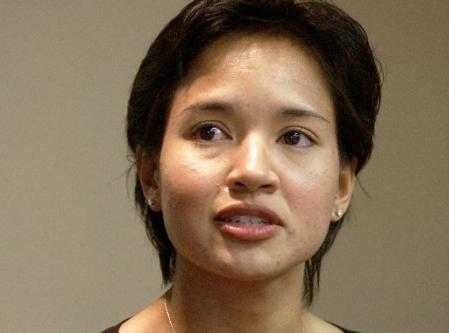
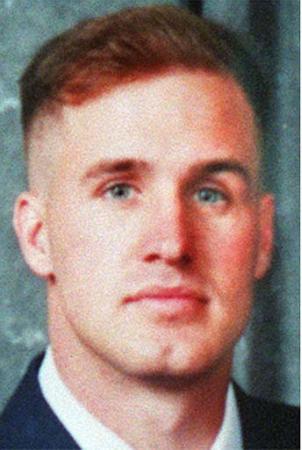
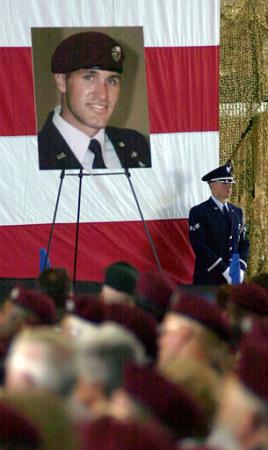
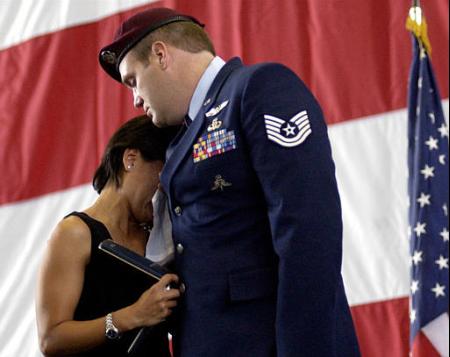
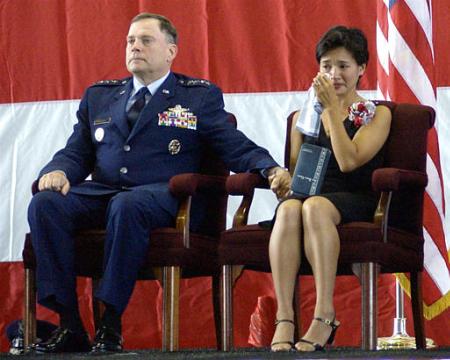
March 24, 2002
Theresa Cunningham tearfully stood before a crowd of more than 100 friends and relatives Saturday, and shared one of her most intimate personal possessions — a goodbye letter that her Air Force husband had written to his wife in case he was killed in Afghanistan.
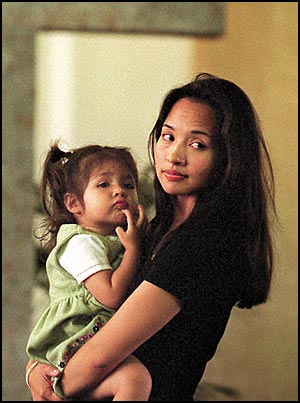
“I want you to know I died a happy man — happy because I met you, happy because I have two beautiful girls and happy because I got to do what I wanted to do,” Senior Airman Jason Cunningham wrote to his 30-year-old wife. She read parts of his letter at a Mass and memorial service held Saturday morning at St. Mary Magdalen Church in Camarillo, California.
Her 26-year-old husband was buried last week with full honors at Arlington National Cemetery in Virginia. Jason Cunningham died in Afghanistan on March 4 alongside six U.S. servicemen during hostile fire that brought down a Chinook MH-47 helicopter and damaged another in snowy mountains.
Cunningham was stationed at Moody Air Force Base in Georgia and was a para-rescueman assigned to the 38th Rescue Squadron. He was the first para-rescueman killed in combat since the Vietnam War
After Saturday’s memorial mass, celebrated by Monsignor John Hughes, Theresa Cunningham said she decided to share her private letter so her loved ones would know her husband was more than a decorated war hero, more than a soldier, more than a highly trained para-rescueman who gave his life to treat and keep safe 10 injured American soldiers under his care.
“He was a great man, he was a great father,” said Cunningham, a former Camarillo resident who met and married her husband in Italy seven years ago when both were in the Navy.
“In the face of danger he was still thinking of me,” Theresa Cunningham told the crowd, which included her two young daughters, ages 2 and 4.
Among those who attended and spoke at the service was Jason Cunningham’s commanding officer, Major Vinnie Savino. In frank detail, Savino told the crowd exactly how Cunningham was killed. Cunningham was skilled in parachuting, diving, the martial arts, survival techniques and emergency medicine.
On March 3, Cunningham was called to help rescue American soldiers who were pinned down on a snowy mountain while fighting al-Qaida fighters, Savino said. His helicopter was hit by a rocket, the pilot was injured and it crashed, injuring many aboard.
Cunningham immediately provided medical treatment to the injured, and over the next several hours he repeatedly exposed himself to enemy fire as he moved the injured Americans to safer locations, Savino said. Cunningham was shot and died from a single gunshot wound the next day.
Theresa Cunningham wore her husband’s wedding band on a chain around her neck as she sat in the front row of the church during the Mass. A large color photograph of Jason in uniform was posted in the church for the service, which included readings from the Old Testament and Book of Revelation.
The monsignor encouraged the audience to follow Jason Cunningham’s lead and live a worthy life. “His life was in defense or our country and to help fellow soldiers,” Hughes said.
Hughes encouraged Theresa Cunningham to tell her daughters their father is with God and still loves them. Christianity, Hughes said, teaches its faithful that death does not separate people from their loved ones. “They are still part of our family, part of us.”
Families Mourn U.S. Soldiers
Wednesday, March 6, 2002
Matthew Commons died Monday in an air and ground offensive against al-Qaida that claimed seven American lives, among them a 26-year-old medic who had two little girls and a 30-year-old math teacher who joined the Army to pay off his student loans.
Eleven other soldiers were wounded during the intense fighting as two helicopters carrying American troops came under attack from machine guns and rocket-propelled grenades.
The remains of the three Rangers, four Army servicemen and one Navy SEAL were flown back to the United States early Wednesday, Staff Sergeant Tom Hernan said. Dover Air Force Base in Delaware was preparing the bodies for burial.
“We cried through the night,” Gregory Commons said, referring also to Matthew’s mother who lives in Nevada. His last conversation with their son was in February, on his 21st birthday.
Later, two MH-47 Chinook helicopter team were ferrying reconnaissance troops south of the town of Gardez when one team was hit by enemy fire, said Brigadier General John W. Rosa Jr., deputy director of operations for the Joint Chiefs of Staff.
Petty Officer 1st Class Neil Roberts, 32, a Navy SEAL based in Norfolk, Virginia, tumbled out of his helicopter but apparently survived the fall and was shot on the ground, said Marine Maj. Ralph Mills, speaking for the U.S. Central Command.
Commons and the other soldiers died during another helicopter mission to bring special forces into the battle area, Rosa said. Once on the ground, those forces got into a firefight.
Among the casualties was Senior Airman Jason Dean Cunningham, 26, a pararescueman with the 38th Rescue Squadron and a trained combat medic who was sent in to bring back members of the team in eastern Afghanistan.
“Jason died doing what he liked to do, save lives,” said his father, Larry “Red” Cunningham, choking on his words as he read a brief statement Tuesday.
“We’re very proud of our baby,” the airman’s mother, Jackie Cunningham, said outside the family’s home in Gallup, New Mexico.
Cunningham, was stationed at Moody Air Force Base near Valdosta, Georgia, where he had a wife, Theresa, and two daughters.
US Airman Killed in Afghan War Honored
Friday March 8, 2002
An airman killed in the bloodiest U.S. operation in Afghanistan was honored by friends and colleagues as a dedicated serviceman who lost his life while saving the lives of others.
Senior Airman Jason Cunningham, one of seven Americans killed in the mountains of eastern Afghanistan on Monday, was hit by machine-gun fire as he treated wounded soldiers and pulled others to safety, said his commander, Major Vincent Savino.
Cunningham, 26, was with the 38th Rescue Squadron at Moody Air Force Base, near Valdosta, Georgia. He was trained as a parachutist, a diver and as a combat medic so he could rescue and care for downed pilots or others in rugged terrain.
“He spent his whole life preparing for that one moment,” Savino said. “He was a great man. I know several soldiers who are alive today because of him.”
More than 1,000 airmen and dignitaries, including Georgia Gov. Roy Barnes, gathered in a hangar beneath a huge American flag on Thursday to honor Cunningham, of Camarillo, California.
His wife, Theresa, attended with the couple’s two daughters, Hannah, 2, and Kyla, 4.
“I want to say that we loved each other,” she said, her voice breaking with emotion. “Jason, I will always love you.”
Air Force officials awarded him a Purple Heart for his wounds in Afghanistan and the Air Force Meritorious Service Medal for rescue work.
Fellow members of the rescue squadron remembered Cunningham as an inspiration to others.
“He was the very man you’d want with you in combat,” Staff Sergeant Craig Clark said. “He died in the service of us all. I’m a better person because of his example and friendship.”
Cunningham and six others were killed and 11 were wounded during intense fighting as helicopters came under attack from machine guns and rocket-propelled grenades. He was on a helicopter that was attempting to rescue a Navy SEAL.
Another of the victims, Specialist Marc A. Anderson, 30, of Brandon, Florida, was honored in the town where he grew up. Officials at Alliance High School in Alliance, Ohio, said they would name a new athletic complex after Anderson, who was a standout shot putter there and wrestled and played football.
His mother said her son wouldn’t have expected any honor.
“I know he was a good kid, and he never would have asked for any of this. I guess if you’re going to build a complex, you should name it for someone who died for his country,” Judy Anderson said.
Wednesday March 6, 2002
Services Set For New Mexico Airman
The family of Senior Airman Jason Cunningham has set services for their son killed in Operation Anaconda.
Jason D. Cunningham, 26, died Monday in an helicopter crash while trying to rescue a fellow serviceman.
Cunningham spent his childhood in Carlsbad and Farmington and spent some time in Gallup, where his parents live.
A memorial service for the senior airman will be held in Carlsbad Saturday. Services begin at 11 in the morning at West Funeral Home.
Memorial for U.S. Airman Killed
Thursday, March 7, 2002
Senior Airman Jason Cunningham, one of seven Americans killed in the bloodiest U.S. operation yet in Afghanistan, was remembered Thursday as a man who devoted his life to helping others.
Cunningham, 26, of Camarillo, California, was a pararescueman with the 38th Rescue Squadron at Moody Air Force Base, near Valdosta. He died on a mission Monday in the frigid mountains of eastern Afghanistan.
Cunningham’s commander, Major Vincent Savino, said the airman was hit by machine-gun fire as he treated wounded soldiers and darted out of a helicopter several times to pull others to safety.
“He spent his whole life preparing for that one moment,” Savino said. “He was a great man. I know several soldiers who are alive today because of him.”
As a pararescueman, Cunningham was trained as a parachutist, a diver and as a combat medic so he could rescue and care for downed pilots or others in rugged terrain.
More than 1,000 airmen and dignitaries, including Georgia Governor Roy Barnes, gathered in a hangar beneath a huge American flag to honor Cunningham. On a table near the speaker’s platform was a large photograph of Cunningham, who was born in Carlsbad, New Mexico.
With the photo were Cunningham’s karate awards, desert-tan combat boots, a paramedic sweat shirt and his high school athletic letter for swimming, football and track.
His wife, Theresa, attending with the couple’s two daughters, Hannah, 2, and Kyla, 4, thanked the airmen and officials for their support.
“I want to say that we loved each other,” she said, her voice breaking with emotion. “Jason, I will always love you.”
Air Force officials awarded him a Purple Heart for his wounds in Afghanistan and the Air Force Meritorious Service Medal for rescue work.
Fellow members of the rescue squadron remembered the airman as a dedicated, capable pararescueman who inspired others.
“He was the very man you’d want with you in combat,” Staff Sergeant Craig Clark said. “He was dependable. He died in the service of us all. I’m a better person because of his example and friendship.”
Cunningham and the others were killed and eleven others wounded during intense fighting near the town of Gardez as helicopters came under attack from machine guns and rocket-propelled grenades.He was on a helicopter that was attempting to rescue a Navy SEAL.
Thursday, March 14, 2002
ARLINGTON, Virginia – As a bugler blew “Taps” among rows of white headstones, 4-year-old Kayla Cunningham stood and saluted her father’s casket draped with an American flag.
Senior Airman Jason Dean Cunningham, a pararescuer killed in Afghanistan), was buried Thursday with military honors at Arlington National Cemetery.
A similar scene played out at a cemetery in Joplin, Missouri, where Army Sergeant Philip Svitak — another casualty of the war in Afghanistan — was also laid to rest with military honors.
In Virginia, Cunningham’s family and fellow soldiers remembered him as a motivated soldier, a good-natured family man and an example to those who knew him.
“You have left behind a legacy to your family and the world. I intend to uphold it,” Cunningham’s father, Lawrence, wrote in a letter he placed in his son’s casket.
Cunningham, 26, a pararescue-squad member, and Svitak, 31, an aircraft repairman, were among seven U.S. servicemen killed March 4, 2002, when hostile fire brought down one Chinook MH-47 helicopter and damaged another.
It was the worst casualty toll in a single offensive operation of the war in Afghanistan.
About 80 pararescuers in their distinctive maroon caps stood nearby during Cunningham’s funeral. A pair of HH-60G Pave Hawk helicopters — commonly used by pararescuers — flew overhead. Three sharp cracks rang out from the seven-person rifle party for a 21-gun salute.
After the service, Jason’s wife knelt against the casket sobbing with their two daughters, Kayla and 2-year-old Hannah.
At the Church of Christ in Joplin, Missouri, several hundred civilians and soldiers said goodbye to their fallen hometown hero, Svitak. He had served as the flight engineer on one of the MH-47s.
“I never dreamed that the events of September 11 would touch the lives of my family,” said Svitak’s brother-in-law, Shawn Starmer.
After the church service, Svitak’s casket was taken to Ozark Memorial Park Cemetery for burial. There, seven Army soldiers in dress uniforms fired off three synchronized rounds for a 21-gun salute and a bugler played “Taps.”
The flag from the casket was folded and presented to Svitak’s wife Laura; and another was given to his mother, Roseann Svitak.
His wife included a note to her husband in the service program.
“You are not only a hero for your country, but you are a hero as a dad and husband,” she wrote.
Laura Svitak said she was sorry her husband would not be with her to watch their two sons — Ethan 5, Nolan, 2 — grow up.
“I had only hoped we would grow old together. Phil, I promise you, the boys and I will love you forever; We will never forget you,” she wrote.
CITATION TO ACCOMPANY THE AWARD OF
THE AIR FORCE CROSS
(POSTHUMOUS)
TO
JASON D. CUNNINGHAM
The President of the United States of America, authorized by Title 10, Section 8742, U.S.C., awards the Air Force Cross to Senior Airman Jason D. Cunningham for extraordinary heroism in military operations against an opposing armed force while serving as a pararescueman near the village of Marzak in the Paktia Province of Afghanistan on 4 March 2002.
On that proud day, Airman Cunningham was the primary Air Force Combat Search and Rescue medic assigned to a Quick Reaction Force tasked to recover two American servicemen evading capture in austere terrain occupied by massed Al Qaida and Taliban forces. Shortly before landing, his MH-47E helicopter received accurate rocket-propelled grenade and small arms fire, severely disabling the aircraft and causing it to crash land. The assault force formed a hasty defense and immediately suffered three fatalities and five critical casualties.
Despite effective enemy fire, and at great risk to his own life, Airman Cunningham remained in the burning fuselage of the aircraft in order to treat the wounded. As he moved his patients to a more secure location, mortar rounds began to impact within fifty feet of his position. Disregarding this extreme danger, he continued the movement and exposed himself to enemy fire on seven separate occasions.
When the second casualty collection point was also compromised, in a display of uncommon valor and gallantry, Airman Cunningham braved an intense small arms and rocket-propelled grenade attack while repositioning the critically wounded to a third collection point. Even after he was mortally wounded and quickly deteriorating, he continued to direct patient movement and transferred care to another medic.
In the end, his distinct efforts led to the successful delivery of ten gravely wounded Americans to life-saving medical treatment. Through his extraordinary heroism, superb airmanship, aggressiveness in the face of the enemy, and in the dedication of his service to his country, Senior Airman Cunningham reflected the highest credit upon himself and the United States Air Force.
Airman credits brother-in-law for decision to join AF
by Senior Airman Jared Marquis
3rd Wing Public Affairs
2 February 2006
ELMENDORF AFB, Alaska — Most people have a hero or someone they credit for being the person they are today.
For me, that person isn’t a teacher, supervisor or parent. While I have had my share of influential people in my life, that credit goes to Senior Airman Jason Cunningham.
Before March 4, 2002, I had never seriously thought about joining the military. I went to see recruiters when I graduated from high school and listened to what they had to say. But, I never really considered the military as a career path.
I wanted to do something important with my life; I just didn’t know what. I worked hard at what I thought I wanted to be, reaching most of my goals and being relatively successful.
But that all changed on March 4, 2002.
That morning, my wife and I received a phone call at 5:30 a.m. A phone call that early is usually bad news, and this time was no different.
My mother-in-law called to tell us that Jason — her son, my wife’s brother, an Air Force pararescueman — had been killed in Afghanistan.
Most of the two weeks after that were a blur. Unless you are faced with it, no one can possibly understand the pain and suffering a situation like that brings.
Before then, I had never directly faced war. As a civilian living in a town without any kind of military influence, other than the local recruiters, I felt a million miles away.
Before that moment, I had never considered the effect war could have on my life.
One of the most powerful moments I experienced was at Jason’s funeral at Arlington National Cemetery. I remember seeing a three-star general salute Jason’s casket as it made its way to his final resting place.
I am here to tell you, even as a civilian, I understood how powerful an image that was. I could see in his face how much respect he had for the fallen Airman.
After the funeral, I had a lot of time to think, and came to a conclusion. I knew I wanted to serve my country the way Jason did, the way that all our fallen servicemembers have.
When Jason died, he left behind a wife and two daughters. I didn’t feel it was right for me to stay home with my wife and kids, enjoying the freedom he fought for. I couldn’t stay home when people like him were unselfishly risking everything. I felt it was my responsibility to stand up and fight.
For that reason, I have a tremendous amount of respect for anyone wearing the uniform of the U.S. military.
It doesn’t matter what job they chose or why they joined, because the bottom line is they accepted the responsibility. They stepped up to defend our country.
Too often, I think we forget why we are here and why we chose this path in our lives. I have a daily reminder of why I am here. Not a day goes by that I don’t think of Jason and what he left behind.
In my technical school class, my instructor would write a question on the board every day. Most of the time it was something like, “What is your favorite movie?”
Usually, I would think for a minute, never really picking out an answer that mattered to me.
But one day he wrote: “If you could talk to anyone, living or dead, who would it be?” Most of my classmates wrote someone famous.
As soon as I saw that question, I knew my answer. Like most of the people affected by Jason’s death, I would give anything for one more conversation with him. I would share with him what his life, and death, meant to me.
Where ever my Air Force career takes me, one person deserves the credit.
That person is Senior Airman Jason Cunningham.
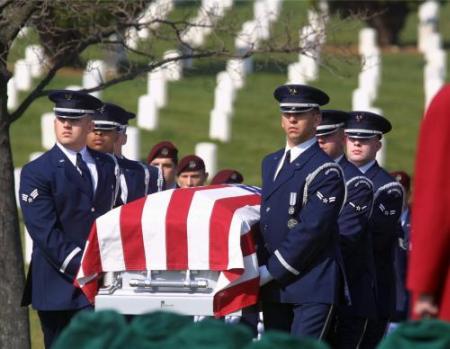
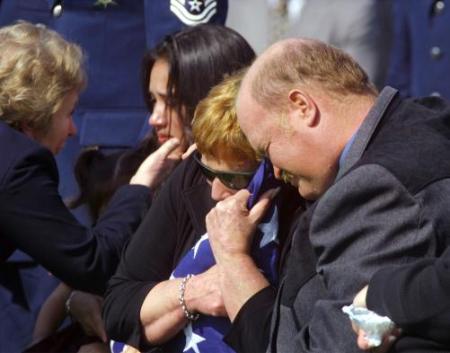
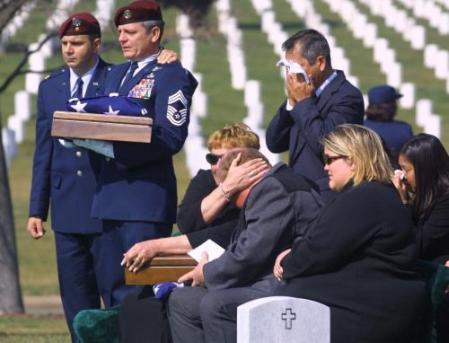
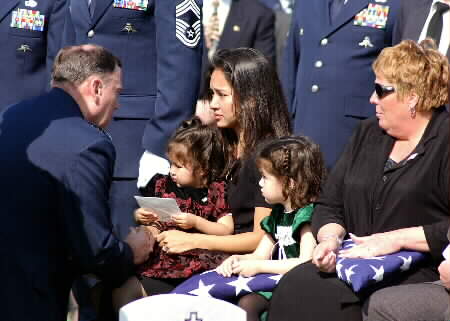
supporting Operation Anaconda in Afghanistan as part of the war on terrorism.
CUNNINGHAM, JASON DEAN
SRA US AIR FORCE
- VETERAN SERVICE DATES: 02/26/1995 – 03/04/2002
- DATE OF BIRTH: 03/27/1975
- DATE OF DEATH: 03/04/2002
- DATE OF INTERMENT: 03/14/2002
- BURIED AT: SECTION 66 SITE 6856
Michael Robert Patterson was born in Arlington and is the son of a former officer of the US Army. So it was no wonder that sooner or later his interests drew him to American history and especially to American military history. Many of his articles can be found on renowned portals like the New York Times, Washingtonpost or Wikipedia.
Reviewed by: Michael Howard

